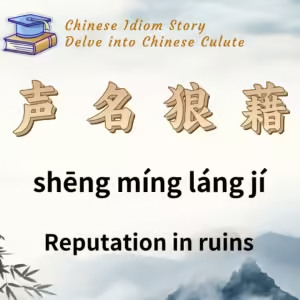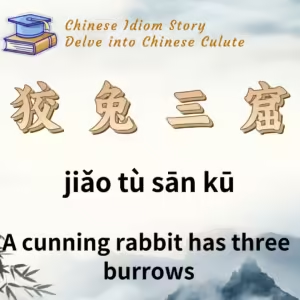
Chinese Idiom: 声名狼藉 (Sheng Ming Lang Ji)
English Translation: Reputation in ruins
pīn yīn: shēng míng láng jí
Idiom Meaning: This idiom describes someone whose reputation has become extremely bad, often due to engaging in numerous wrongdoings. “声名” (shēng míng) refers to one’s reputation, while “狼藉” (láng jí) originally described the disorder caused by a pack of wolves, later coming to signify something being in complete disarray or utter ruin.
Historical Source: Records of the Grand Historian (《史记》), specifically from the biography of Meng Tian (蒙恬).
Idiom Story:
Meng Tian was a famous general during the Qin Dynasty, known for his military prowess and loyalty to the state. After the establishment of the Qin Empire, Emperor Qin Shi Huang assigned Meng Tian the critical task of leading a force of 300,000 soldiers to defend against the Xiongnu invaders from the north. Under Meng Tian’s command, the Qin army successfully reclaimed large territories on both sides of the Yellow River. Following Qin Shi Huang’s orders, Meng Tian then supervised the construction of the Great Wall, connecting the existing fortifications of the former Qin, Zhao, and Yan states, and extending it from the western regions of Lin Tao (modern-day Min County, Gansu) to the eastern part of Liaodong. This monumental project took many years to complete.
Meng Tian’s brother, Meng Yi, also served Qin Shi Huang faithfully, earning great merits in the unification of the empire. However, after Qin Shi Huang’s death, the political climate within the Qin court changed dramatically. Zhao Gao, a powerful court official, and Li Si, a chancellor, manipulated the succession, placing Qin Shi Huang’s younger son, Hu Hai, on the throne. Zhao Gao then seized control of the court.
During Qin Shi Huang’s reign, Zhao Gao had been involved in corruption and abuse of power. When Qin Shi Huang learned of Zhao Gao’s misconduct, he ordered Meng Yi to investigate the case. Meng Yi conducted a thorough investigation, uncovered the truth, and sentenced Zhao Gao to death. However, Zhao Gao managed to escape punishment by pleading with Qin Shi Huang, who eventually pardoned him.
After Qin Shi Huang’s death, Zhao Gao sought revenge. He persuaded the newly enthroned Emperor Qin Er Shi (Hu Hai) to order Meng Yi’s execution. Before his death, Meng Yi defended himself by citing historical examples of rulers who had unjustly executed their loyal ministers, such as the Qin general Bai Qi, the Chu minister Wu She, and the Wu general Wu Yuan. He warned that these rulers became “声名狼藉” (infamous and condemned throughout the states), but his words fell on deaf ears. Hu Hai, influenced by Zhao Gao, ultimately ordered Meng Yi’s execution.
At the time, Meng Tian was still stationed with his troops guarding the northern frontier. Fearing Meng Tian might resist, Hu Hai, under Zhao Gao’s influence, hastily sent a messenger to command Meng Tian to commit suicide.
This tragic story gave rise to the idiom “声名狼藉,” symbolizing a person whose reputation has been utterly destroyed due to their misdeeds, leading to widespread condemnation and disgrace.






